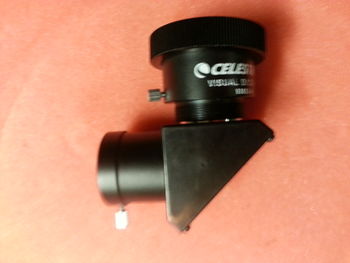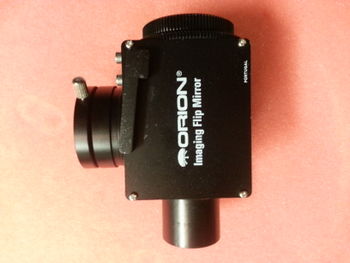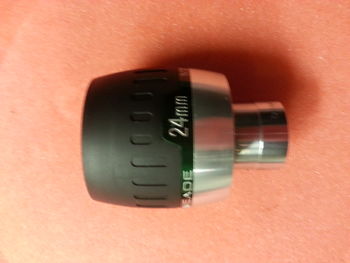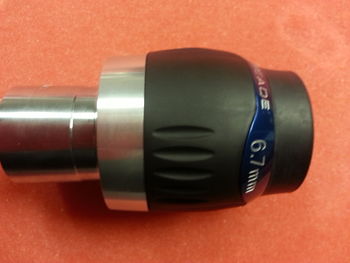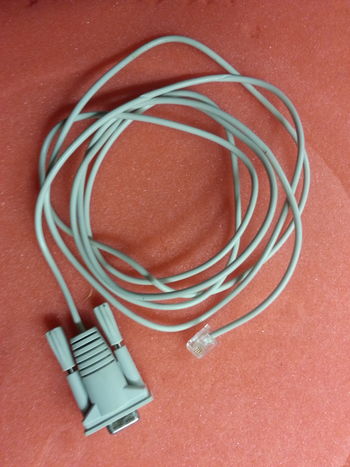Difference between revisions of "Observational Astronomy"
| Line 11: | Line 11: | ||
Next you need to find an area with a large viewing angle with a plug-in nearby. There are a few decent locations right around Willamette. Transport all your gear to that area, and begin setup of the telescope stand. To start widen the base, then unscrew the nut holding the bottom support, then twist the bottom support so that the stand legs rest in their slots, then rescrew in the nut, pushing the bottom plate tightly against the legs. Snapshots of this process are seen below. | Next you need to find an area with a large viewing angle with a plug-in nearby. There are a few decent locations right around Willamette. Transport all your gear to that area, and begin setup of the telescope stand. To start widen the base, then unscrew the nut holding the bottom support, then twist the bottom support so that the stand legs rest in their slots, then rescrew in the nut, pushing the bottom plate tightly against the legs. Snapshots of this process are seen below. | ||
[[File:20140612_111151.jpg|350px]][[File:20140612_111227.jpg|350px]][[File:20140612_111401.jpg|350px]] | [[File:20140612_111151.jpg|350px]][[File:20140612_111227.jpg|350px]][[File:20140612_111401.jpg|350px]] | ||
| + | Next you'll need to level the telescope stand. It is absolutely necessary that you level it as best as you can, otherwise the star tracking will be slightly off. TThe level is directly on top of the stand and can be adjusted by raising and lowering the leg extensions. The level is shown below. | ||
| + | [[File:20140612_111414.jpg]] | ||
Revision as of 13:36, 12 June 2014
Observational Astronomy
This wiki will give a full explanation on how to use the Celestron CPC 800, and how, through the use of the native GPS tracking software within the telescope as well as the computer program Stellarium, one can observe various planets and stars. The first step is grabbing the needed components. You'll need the telescope and telescope stand, the Celestron Visual Back and star diagonal, or Orion Flip Mirror. These two components are shown below.
You'll also need an observing lens. We have two a 24mm and 6.7mm Meade. Those are shown below.
You'll also need a com port cable shown below to hook up the telescope with the computer.
Lastly you'll need a computer with the Stellarium program installed, two extension cords, and a cart to roll everything on.
Next you need to find an area with a large viewing angle with a plug-in nearby. There are a few decent locations right around Willamette. Transport all your gear to that area, and begin setup of the telescope stand. To start widen the base, then unscrew the nut holding the bottom support, then twist the bottom support so that the stand legs rest in their slots, then rescrew in the nut, pushing the bottom plate tightly against the legs. Snapshots of this process are seen below.
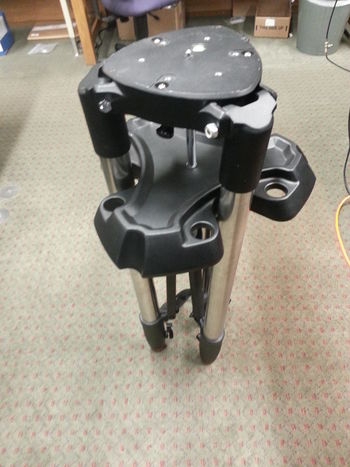
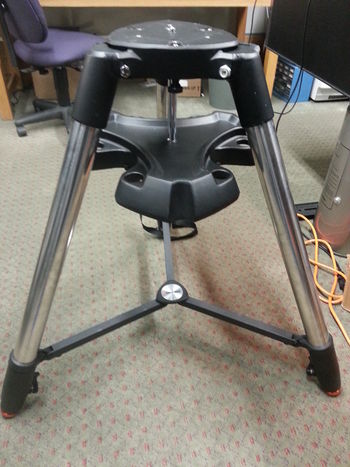
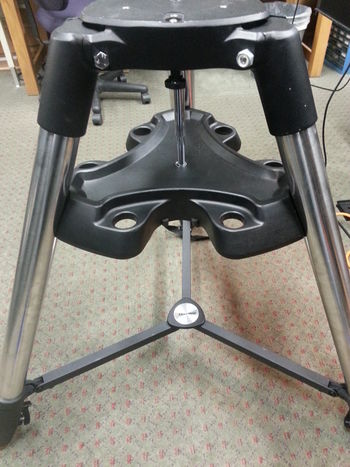 Next you'll need to level the telescope stand. It is absolutely necessary that you level it as best as you can, otherwise the star tracking will be slightly off. TThe level is directly on top of the stand and can be adjusted by raising and lowering the leg extensions. The level is shown below.
Next you'll need to level the telescope stand. It is absolutely necessary that you level it as best as you can, otherwise the star tracking will be slightly off. TThe level is directly on top of the stand and can be adjusted by raising and lowering the leg extensions. The level is shown below.
